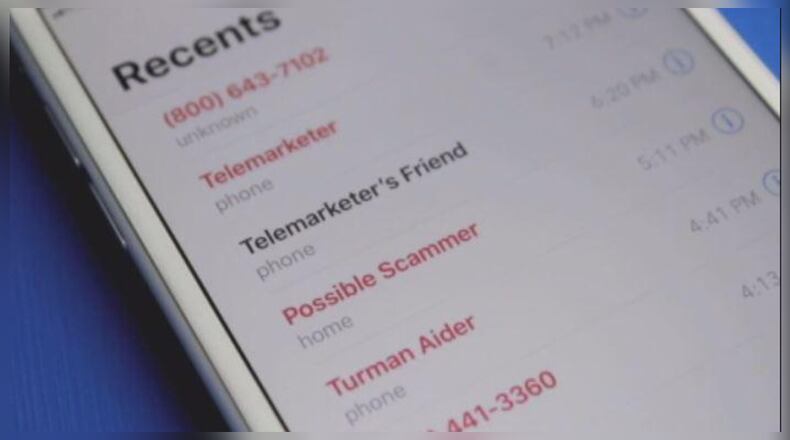Many people are fed up with spam calls, which can far exceed the number of calls they get from friends, family and legitimate sources. Robocalls are the largest source of complaints.
That makes sense, considering an estimated 2.2 billion robocalls were placed in Ohio in 2019, meaning the average resident received more than 178 calls, according to YouMail, a company that offers services to protect against robocalls.
Experts and FTC officials say consumers who add their phone numbers to the Do Not Call registry should see a reduction in calls — at least from legitimate companies.
“The law-following companies aren’t going to call consumers anymore to try and sell them goods and services,” said Ian Barlow, a staff attorney with the FTC and program manager for Do Not Call enforcement. “Second, it’s going to let the consumer know that if somebody still calls them to try to get money, they are violating the law — meaning it’s a non-compliant company, and you don’t want to deal with them.”
Barlow also said there are some other useful steps people can take to try to reduce nuisance calls.
MORE: Sick of robocalls? Feds told to toughen rules on illegal calls
Consumers who do not want to receive most telemarketing sales calls can place their phone numbers on the National Do Not Call Registry.
About a month later, most telemarketers and sellers have to remove registered numbers from their calls lists.
Telemarketers who violate the rules can face fines, legal action and other consequences.
Despite potential penalties, some companies and groups ignore the law and call registered numbers anyway.
In fiscal year 2019, the FTC received 214,863 complaints from Ohio consumers about alleged Do Not Call violations, including 18,650 complaints from people in Butler, Champaign, Clark, Greene, Miami, Montgomery and Warren counties.
Statewide, complaints dipped less than 1% from the prior year, and were down 22% from fiscal year 2017.
In the seven-county Miami Valley region, complaints were up almost 5% from the prior year. However, complaints have fallen more than 18% from FY 2017.
More than 1.1 million phone numbers with a 937 area code are listed on the Do Not Call Registry.
MORE: ‘It can happen to anyone:’ Scam artists prey on Dayton-area residents, stealing millions
Some calls come from live sales people.
The FTC, after receiving a complaint, will check to see if the numbers sales people phoned are on the Do Not Call list.
If the numbers are registered, the FTC may take action against the callers.
Most complaints the FTC receives are about unwanted calls featuring recorded messages.
Nearly three-fourths of complaints in the seven-county Miami Valley region were about robocalls last year. YouMail estimates that robocalls in Ohio have more than doubled since 2017.
On average, the FTC estimates it receives one complaint for every 5,000 to 10,000 illegal calls made to consumers, officials say.
Robocalls about the sale of products and services are illegal, regardless of whether or not a phone number is on the Do Not Call Registry, unless the caller has written permission from the consumer, the FTC said.
The most common types of robocall and telemarketing complaints in Ohio are about reducing debt, medical services and prescriptions, imposters, warranty and protection plans and vacations and timeshares.
MORE: DANGEROUS SCAMS: 10 schemes that hustled the most money from victims
A huge share of robocalls are illegal, and that is a strong sign that the products or services they are trying to sell are scams, Barlow said. When companies call numbers on the Do Not Call list, it also suggests they are bad actors.
“If somebody is calling you illegally, why would you want to give them your personal information or money?” Barlow asked.
Barlow says consumers would be wise not to answer calls from unknown numbers.
Answering the phone reveals that a number works and reaches a live person. This often can lead to future unwanted calls.
When consumers have to answer unfamiliar numbers, because they are expecting legitimate calls, they should hang up right away if they hear a recorded message or encounter a sales person, Barlow said.
“The more time consumers spend on the phone, the greater indication they give that it is an active phone number and it’s somebody who is receptive to listening to solicitations of money,” he said.
Consumers can block phone numbers using their cell phones, which offer the features. They also can download call-blocking apps or acquire spam-call protection devices or services.
The FTC says consumers should not call back numbers that ring only once. This can be a costly scam.
It also says consumers should never pay over the phone using a gift card from Amazon, Apple or anywhere else, because these are scams, likely with perpetrators located outside of the United States.
Consumers also should file complaints about violations to the FTC to help the agency target its law enforcement efforts, Barlow said.
Consumers who believe companies have violated the Do Not Call rules can file a complaint with the FTC at www.donotcall.gov. Consumers can register their phone numbers on the Do Not Call list at that web address.
About the Author

